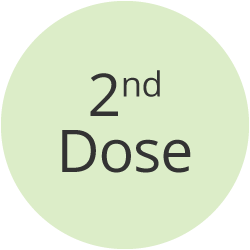Vaccine (Shot) for Tetanus

How to pronounce tetanus: Listen
Five doses of a DTaP shot for children and one Tdap shot for preteens are recommended by doctors as the best way to protect against tetanus.
When should my child get a tetanus shot?
One dose of DTaP at each of the following ages:
One dose of Tdap at the following ages:
Why should my child get a tetanus shot?
- Protects your child from tetanus, which can be a serious and even deadly disease, as well as diphtheria and whooping cough (pertussis).
- Protects your child from painful muscle stiffness from tetanus.
- Keeps your child from missing school or child care, and you from missing work.
What vaccines protect against tetanus?
There are 2 vaccines that help protect children against tetanus: DTaP and Tdap. Both also protect against diphtheria and whooping cough. These shots do not offer lifetime protection. People need booster shots to keep up protection.
Tetanus shots are safe.
Tetanus shots are safe and effective at preventing tetanus. Vaccines, like any medicine, can have side effects. These are usually mild and go away on their own.
What are the side effects?
Most children don’t have any side effects from DTaP or Tdap. The side effects that do occur from DTaP are usually mild, and may include:
- Soreness or swelling where the shot was given
- Fever
- Fussiness
- Feeling tired
- Loss of appetite
- Vomiting
More serious side effects are very rare but with DTaP can include:
- A fever over 105 degrees
- Nonstop crying for 3 hours or more
- Seizures (jerking, twitching of the muscles, or staring)
The side effects from Tdap are usually mild, and may include:
- Pain, redness, or swelling where the shot was given
- Mild fever
- Headache
- Feeling tired
- Nausea, vomiting, diarrhea, and stomachache
Some preteens and teens might faint after getting Tdap or any other shot.
To prevent fainting and injuries related to fainting, people should be seated or lying down during vaccination and remain in that position for 15 minutes after the vaccine is given.
Prepare for your child's vaccine visit and learn about how you can:
- Research vaccines and ready your child before the visit
- Comfort your child during the appointment
- Care for your child after the shot
What are the symptoms of tetanus?

The first sign is most commonly spasms of the muscles of the jaw, or “lockjaw.”
- Jaw cramping
- Sudden, involuntary muscle spasms – often in the stomach
- Painful muscle stiffness all over the body
- Trouble swallowing
- Seizures (jerking or staring)
- Headache
- Fever and sweating
- Changes in blood pressure and heart rate
What is tetanus?
Tetanus is a serious disease caused by a toxin made by a bacteria called Clostridium tetani. It causes painful muscle stiffness and can be deadly.
When the tetanus bacteria invade the body, they produce a toxin that causes painful muscle contractions. Another name for tetanus is “lockjaw.” It often causes a person’s neck and jaw muscles to lock, making it hard to open the mouth or swallow.
Is it serious?
Tetanus is very dangerous. It can cause breathing problems, muscle spasms, and paralysis (unable to move parts of the body). Muscle spasms can be strong enough to break a child’s spine or other bones.
It can take months to recover fully from tetanus. A child might need weeks of hospital care. As many as 1 to 2 out of 10 people who get tetanus dies.
How could my child get tetanus?

Stepping on nails or other sharp objects is one way people are exposed to the bacteria that cause tetanus. These bacteria are in the environment and get into the body through breaks in the skin.
Tetanus is different from other vaccine-preventable diseases because it does not spread from person to person.
Tetanus bacteria are found in soil, dust, and manure. They get into the body through breaks in the skin, including:
- Punctures, cuts, or sores on the skin
- Burns
- Animal bites
The Centers for Disease Control and Prevention, American Academy of Family Physicians, and American Academy of Pediatrics strongly recommend children receive all vaccines according to the recommended vaccine schedule.
- Get a list of vaccines that your child may need based on age, health conditions, and other factors.
- Learn the reasons you should follow the vaccine schedule.
Related Resources:
- Vaccine Information Statements (VISs) have detailed information about recommended vaccines. Read the VISs for vaccines that protect against diphtheria:
- DTaP vaccine — protects against diphtheria, tetanus, and whooping cough (for infants and children) (Other Languages)
- Tdap vaccine — protects against diphtheria, tetanus, and whooping cough (for preteens, teens, and adults) (Other Languages)
- Td vaccine – protects against diphtheria and tetanus (for adults) (Other Languages)





